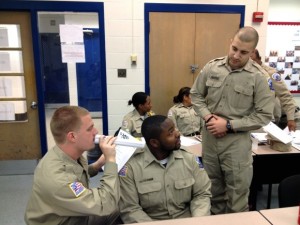Where to Look for Support When Starting Your Career in Corrections

Given that you are wearing a peace officer's uniform, scrutinized under the microscope of some senior staff members, and trying to piece it all together, you must consider the many stressors that come with your profession. Of course, supportive colleagues are the ones most equipped to help you weed through the demands, frustrations and complex situations of the job. Thereafter, it will be time to clock out and go home to your other support system: Family and loved ones.
Tapping into Friendships
Friends are viable sources of support, especially those authentic ones who are ubiquitous during both good times and bad times. Cherish these individuals; they are fountains of hope and impeccable listeners. Further, genuine friends will not necessarily tell you what you wish to hear but will lay it on the line with pure, plain candor. There is no denying we all need this brand of buddy, peace officers included. Harboring tensions while on the job serves no purpose other than to distract you from due diligence. Bad things can happen, including line-of-duty death.
Social support is a staple ingredient of a sound existence and a cadet's emotional welfare. The amount of stress is enormous, chronic, and burdening officers in the criminal justice system. Filtering through all the things which will weigh heavy on you is paramount. Whether it is via your family, friends, or colleagues, talk it out. Never bottle up what is on your mind and bothering you!
Familial Support
Accessing support from family is instrumental in the welfare of any peace officer, especially cadets. In the early stages of your career, you are short on experience. You will be exposed to a multitude of situations involving complex and inexplicable human behavior. Hostilities are omnipresent. Remember, you will feel the urge to vent to your family, and share details about your day-to-day experience. It is important for you to maintain the "confidentiality" policies of your agency or institution. However, it helps to talk to family about the pressures you are enduring. Not to scare or burden them with anxiety but to allow your spouses and loved ones to assist you and comprehend the job's demands.
Although the number has decreased in general society, divorces remain high in law enforcement circles. Duty-related sacrifices are seemingly endless in the criminal justice arena. Holidays with family are often unattended, stemming from shift work. Attending in-service training or court on general days off can further fray the weave of family unity. You are in a business that never closes. Never will. Hence, demands are omnipresent and consume precious family time. Theoretically, sharing aspects of your career (and its demands) with family vitally places everyone on the same page.
Accessing Clinical Staff
Nowadays, most agencies have trained clinical staff (or contract with services) to provide professional counseling. Never shy away from an opportunity to vent. In constructive ways, seek to alleviate the mental burdens imposed by work-related items. No matter the so-called stigma of "weakness" believed to stem from seeking help, the truth is...asking for help is a definite strength. Don't fall prey to old-school thinking. Self-preservation is your right, and a wise choice.
Staying in Good Physical Shape
Physical conditioning works wonders for the healthy balance required of peace officers. Being fit is a basic health aspect. Professionally speaking, physical fitness bolsters your duty performance. Law enforcers working the streets must be well-conditioned so the physical demands of chasing suspects, taking down bad guys, and effecting arrests of resistant individuals will not result in injury.
The same is largely true for correctional officers. Being among a huge population of inmates who wish to test your mettle requires a calm demeanor and an impressive physique, not only to convey "command presence" but to also thoroughly handle (subdue/restrain) those who wish to challenge you and the institutional rules/regulations.
In either realm, the bad guys have the opportunity to body-build and have shown their propensity to injure or kill criminal justice personnel. You have a clear choice. Choose wisely. Supplement physical conditioning with nutrition and adequate sleep patterns and you will realize how formidable you are, justly. Your physicality was sculpted quite well while in the academy. Or buffed upon entry into the academy setting. Expand upon the knowledge given by physical education instructors. Why let it slip away?
Fraternal Support
Akin to familial supports, holding status as a peace officer cadet means you automatically inherited a pseudo-family. The subculture of law enforcement is traditionally founded on utter reliance on brothers/sisters in uniform. It is a large part of your training. To that end, when times get tough, you have an extended family to whom you can relate, and vice-versa. No matter the reasoning, "back-up" is available 24/7. Place the call to one specific colleague and you will likely get a group of officers at your house.
Join and attend organizations for police and correctional officers. Listen to the stories, struggles and triumphs of others; share your own. You'll be amazed at how equivalent each tale is in terms of stress-load and how each officer deals with the dilemmas of the job. Much like the academy and your field training, listening is more important than talking. However, in this particular circumstance, talking is equally critical and thus highly encouraged.
Be Resourceful
Besides those listed here, by all means, incorporate any other legitimate support mechanisms you can think of. No person is the same, and each of us deals with stress differently. Devise a program which suits you, at least one with basic elements of emotional well-being. No one can hold your hand while performing duties. However, it certainly makes one feel restored, refreshed, and self-confident after healthy doses of family time, social engagement, physical exercise, and fraternal camaraderie are experienced. It may not be easy, yet it can be done. Implementing sources of support will bolster your overall outlook, performance and ability to survive as a first-year cadet. Moreover, they will fulfill and help maximize your entire career.








